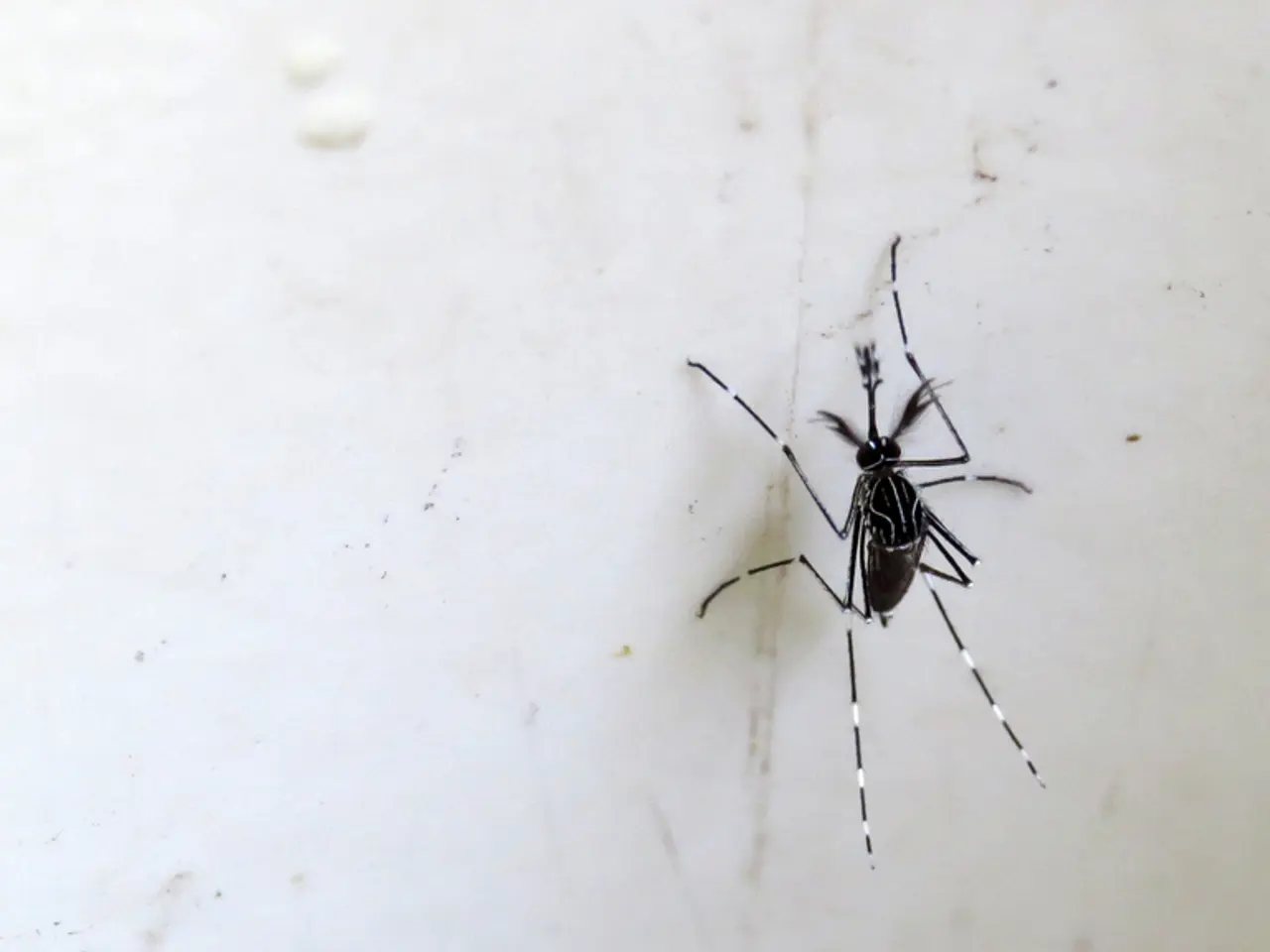Mosquito alert in Fellbach: Asian tiger mosquito returns once again
In the Remstal district of Germany, the Asian tiger mosquito has been detected in several locations, including Fellbach and Kornwestheim. This small, black and white striped mosquito, known scientifically as Aedes albopictus, is diurnal, aggressive, and can carry viruses such as Dengue, Zika, and Chikungunya.
The Asian tiger mosquito reproduces by laying eggs that can survive dry periods and hatch when water is added. This makes it crucial to eliminate standing water, a common breeding ground for these mosquitoes. In response, Kernen, a town in Remstal, has implemented an action program to combat the Asian tiger mosquito. This includes regular information events and the project "Street Patrons."
The recommended steps for controlling the spread of Asian tiger mosquitoes in residential areas, as demonstrated by the example of Kernen, focus primarily on eliminating mosquito breeding sites and personal protection measures.
- Eliminating standing water: Regularly empty flowerpots, buckets, birdbaths, pet bowls, and other containers after rain, change water every 2-3 days, and ensure gutters, drains, and downspouts are clean and flowing freely.
- Covering water storage containers: Cover rain barrels and basins with tight-fitting lids to prevent mosquito access.
- Inspecting and removing hidden water collections: Inspect and remove water collections in items like tarps, wheelbarrows, children’s playsets, unused tires, swimming pools, boats, planters, trash bins, and recycling bins.
- Using biological larvicides: Use Bacillus thuringiensis israelensis (BTI) in stagnant water that cannot be eliminated, which kills larvae without harming fish or pets.
- Improving outdoor environment: Trim vegetation, prune overhanging branches to reduce shaded humid resting areas for mosquitoes, and improve airflow through fans or landscaping.
- Installing screens: Install screens on windows, doors, porches, and seating areas to create mosquito-free zones and reduce indoor entry.
- Using insect repellents and protective clothing: Use EPA-approved repellents with DEET, picaridin, or oil of lemon eucalyptus, particularly during peak mosquito activity times at dawn and dusk.
- Being vigilant during heavy rain periods: Maintain mosquito control measures, as rains increase breeding opportunities.
Though the sources do not describe Kernen's measures in exact detail, these widely recommended practical steps correspond closely to the integrated mosquito management approaches used in European residential areas like Remstal. The emphasis is on preventing mosquito breeding by eliminating suitable habitats, protecting residents from bites, and applying environmentally safe larvicides where necessary.
Kornwestheim has reported a widespread infestation in 2024 and has invested in Bti tablets and awareness campaigns. Fellbach's citizens are called to take action to prevent a mosquito season with consequences, as over 80% of breeding grounds for the Asian tiger mosquito are on private properties.
Stuttgart-Weilimdorf has become a symbol of the spread of the Asian tiger mosquito, and the trend is for it to spread further into the city area. Sightings of the Asian tiger mosquito can be reported via the KABS reporting portal. The local health department has confirmed two specimens of the Asian tiger mosquito in Fellbach.
The mayor of Kernen, Benedikt Paulowitsch, emphasizes that the Asian tiger mosquito is already present in their community. The risk of these viruses is currently low but not zero in Fellbach. The Asian tiger mosquito can establish itself permanently in densely populated areas.
In summary, these measures collectively help control the Asian tiger mosquito population sustainably in residential areas like those in Remstal, Germany.
- The Asian tiger mosquito, Aedes albopictus, is a serious concern in the field of workplace-wellness due to its ability to carry viruses like Dengue, Zika, and Chikungunya.
- The Remstal district, specifically Kernen, has taken proactive steps to combat the Asian tiger mosquito through an action program.
- Regular information events and the "Street Patrons" project are part of Kernen's action program to address the Asian tiger mosquito issue.
- Eliminating standing water is a critical aspect of controlling the Asian tiger mosquito population in residential areas.
- After rain, flowerpots, buckets, birdbaths, pet bowls, and other containers should be emptied, and water should be changed every 2-3 days.
- Gutters, drains, and downspouts should be kept clean and flowing freely to prevent mosquito breeding.
- Covering water storage containers like rain barrels and basins with tight-fitting lids is necessary to prevent mosquito access.
- Hidden water collections in items like tarps, wheelbarrows, children’s playsets, unused tires, swimming pools, boats, planters, trash bins, and recycling bins should be inspected and removed.
- Bacillus thuringiensis israelensis (BTI), a biological larvicide, can be used in stagnant water that cannot be eliminated, killing larvae without harming fish or pets.
- Improving outdoor environment by trimming vegetation, pruning overhanging branches, and increasing airflow through fans or landscaping can help reduce mosquito breeding areas.
- Installing screens on windows, doors, porches, and seating areas can create mosquito-free zones and reduce indoor entry.
- EPA-approved repellents with DEET, picaridin, or oil of lemon eucalyptus should be used for personal protection during peak mosquito activity times.
- During heavy rain periods, it's essential to maintain mosquito control measures, as rains increase breeding opportunities.
- In 2024, Kornwestheim reported a widespread infestation and invested in Bti tablets and awareness campaigns.
- Fellbach's citizens are encouraged to take action to prevent severe mosquito seasons, as over 80% of breeding grounds are on private properties.
- Stuttgart-Weilimdorf serves as a symbol of the spread of the Asian tiger mosquito and may continue to spread further into city areas.
- The KABS reporting portal is available for sightings of the Asian tiger mosquito.
- Two specimens of the Asian tiger mosquito have been confirmed in Fellbach by the local health department.
- The Asian tiger mosquito can establish itself permanently in densely populated areas, posing a potential health risk.
- The risk of these viruses is currently low but not zero in Fellbach.
- The measures taken together can help control the Asian tiger mosquito population sustainably in residential areas like those in Remstal, Germany.
- Science plays a crucial role in understanding the Asian tiger mosquito and developing effective strategies for its management.
- In terms of environmental science, combating the Asian tiger mosquito necessitates an integrated approach that considers climate change, ecosystems, and biodiversity.
- Manufacturing and retail industries must take precautions to prevent the potential introduction and spread of the Asian tiger mosquito on goods and materials.
- Mental health is essential at the workplace, which means providing a safe and healthy environment that eliminates pests like the Asian tiger mosquito.
- In the realm of fashion and beauty, skincare products can incorporate ingredients like cannabidiol (CBD) to soothe itchiness caused by mosquito bites.
- In the realm of entrepreneurship, businesses specializing in interior design, transportation, leadership, diversity and inclusion, and innovative technologies may develop solutions for long-term mosquito control, such as smart home devices, wearables, and gadgets that utilize artificial intelligence and data and cloud computing.




